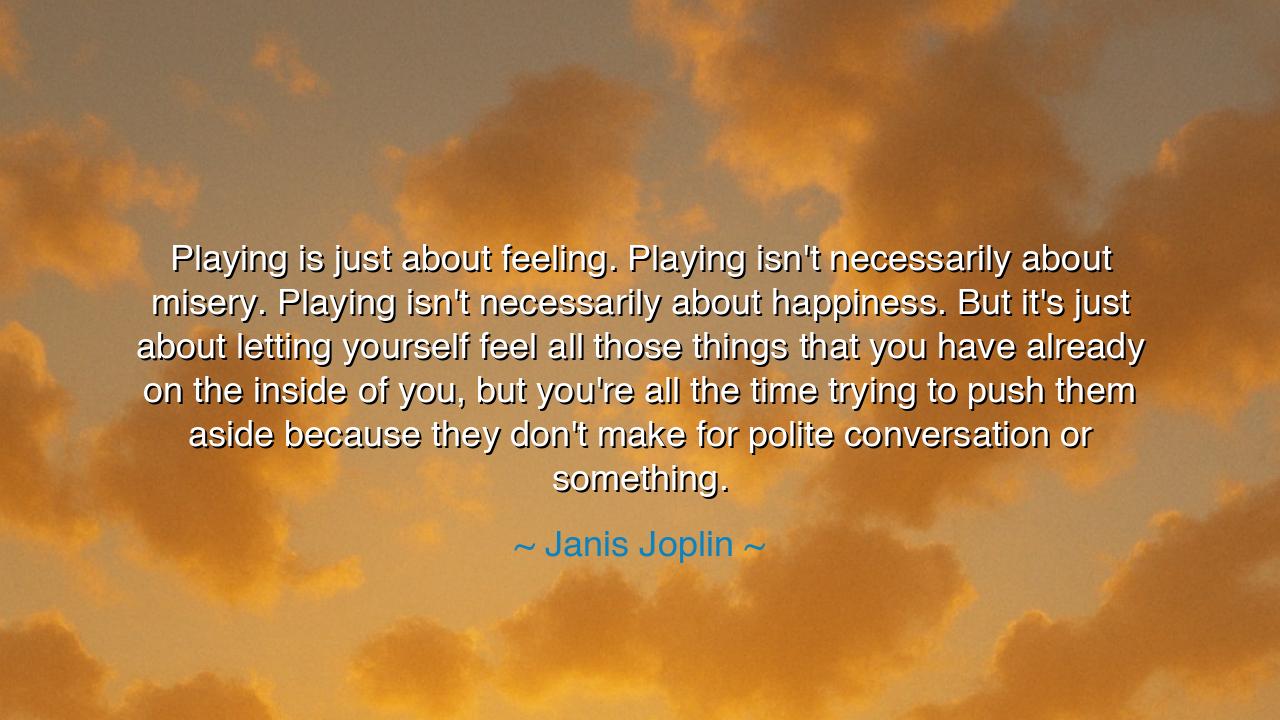
Playing is just about feeling. Playing isn't necessarily about
Playing is just about feeling. Playing isn't necessarily about misery. Playing isn't necessarily about happiness. But it's just about letting yourself feel all those things that you have already on the inside of you, but you're all the time trying to push them aside because they don't make for polite conversation or something.






“Playing is just about feeling. Playing isn’t necessarily about misery. Playing isn’t necessarily about happiness. But it’s just about letting yourself feel all those things that you have already on the inside of you, but you’re all the time trying to push them aside because they don’t make for polite conversation or something.”
Thus spoke Janis Joplin, the wild, unrestrained soul of a generation, whose voice was both a cry and a prayer. In these words, she reveals a truth not only about music, but about the human heart itself — that true expression is born not from performance or perfection, but from feeling. For Joplin, playing — whether it meant singing, creating, or living — was not about pleasing others, nor about fitting within the bounds of politeness or propriety. It was about releasing what lies buried within, allowing one’s inner storms and joys to speak in their own raw, unfiltered language.
The origin of this wisdom can be traced to Joplin’s own life — a life of intensity, beauty, and pain. Born in Texas, she grew up feeling out of place, mocked for her appearance and spirit. Music became her refuge, her battlefield, and her liberation. On the stage, she poured out the full weight of her emotions — longing, rage, love, and despair — until her audience could not help but feel them too. Her performances were not polished acts; they were acts of truth. When she said that playing is “just about feeling,” she was defining her art as the act of becoming one’s truest self, if only for a moment, stripped of masks and fear.
Feeling, in Joplin’s vision, was sacred. It was the lifeblood of creation, the current that connects human beings to one another and to the divine. To feel deeply — whether sorrow or joy — was to live fully. But society, she observed, teaches people to hide their emotions, to maintain the mask of composure, to avoid revealing what is “impolite.” Thus, most live half-lives, numbing the heart to avoid discomfort. Joplin’s defiance of that silence was revolutionary: through her art, she made the world remember that to feel is not weakness, but strength. In a world that valued control, she offered surrender; where others sought approval, she sought truth.
The ancients, too, honored this path of emotional honesty. The poet Sappho, who sang of love’s sweetness and pain, and the philosopher Heraclitus, who wept for the folly of mankind, both knew that the depth of feeling is the measure of life itself. Even the great tragedians of Greece understood that catharsis — the release of buried emotion — purifies the soul. Janis Joplin, in her modern voice, speaks this same ancient truth. Through music, she gave herself — and all who listened — the freedom to feel without fear, to bring the hidden self into the light, to let art become a confession and a cleansing.
Consider the tale of Billie Holiday, who sang “Strange Fruit,” a song of haunting protest against injustice. Her voice trembled not with performance, but with pain — the pain of her people and her own soul. Like Joplin, Holiday did not hide behind politeness; she sang what others dared not speak. In doing so, she transformed grief into power, sorrow into song. Both women understood that the artist’s role is not to decorate reality, but to reveal it, no matter how uncomfortable that truth may be. Art is not polite conversation; it is the language of the heart laid bare.
Joplin’s message, then, extends far beyond music. She calls each of us to stop pushing aside the emotions that live within us — our sadness, our anger, our love, our longing. For these, too, are part of our humanity. The tragedy of life is not that we feel too much, but that we are taught to feel too little. To play, to live, to love, is to allow oneself to feel wholly, to bring the inner world into motion, even when it trembles or breaks. Only in this way can the soul breathe. Only in this way can authenticity be born.
So, my child, take this lesson into your heart: do not fear your feelings, and do not silence them for the sake of others’ comfort. When you create, when you speak, when you live, let your heart be unguarded. Pour into your words, your work, your song, the truth of what you carry inside. Do not aim to be polite; aim to be real. Let your joy laugh loudly, let your sorrow weep freely, let your anger burn cleanly — for in the fullness of feeling, life itself is sanctified.
And when the world tells you to hide, remember Janis Joplin — that wild, brave voice who burned like a comet. She did not play to please; she played to feel, and through that feeling, she touched eternity. For in the end, to live truthfully is the greatest art of all, and the heart that dares to feel becomes, in its own way, immortal.






AAdministratorAdministrator
Welcome, honored guests. Please leave a comment, we will respond soon